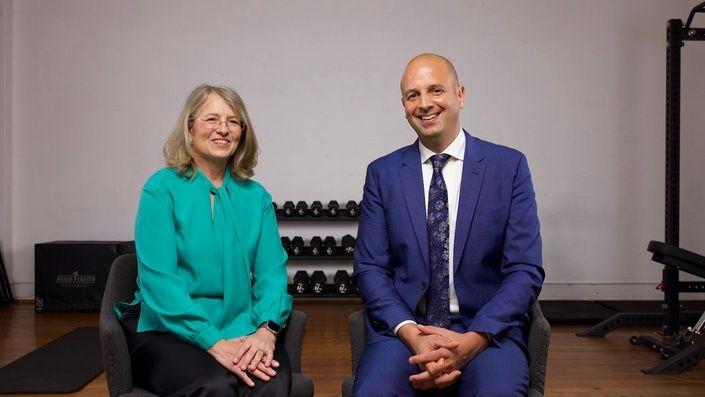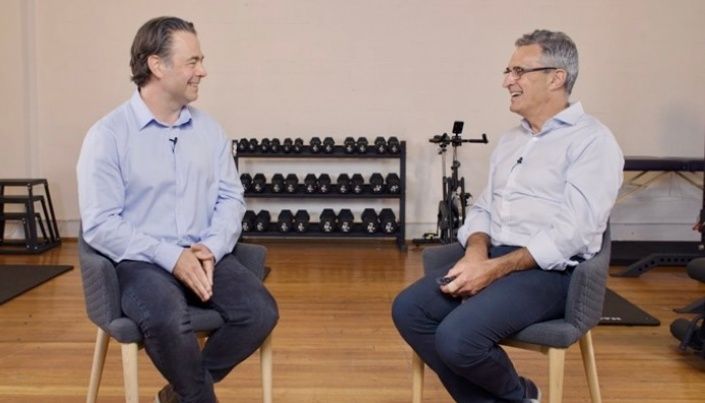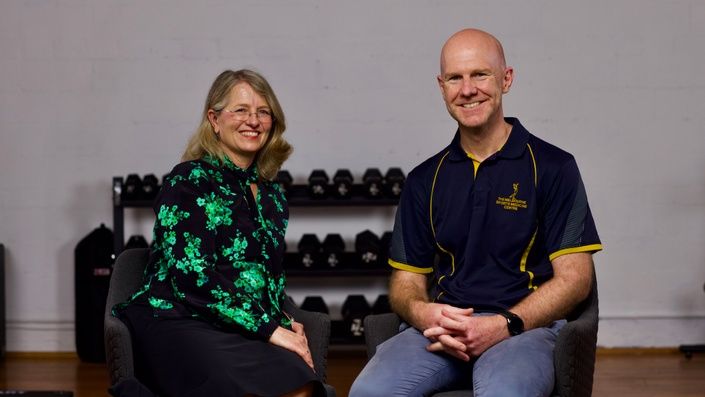Welcome back to the 5th instalment of Mick's 2 cents blog!
If you missed my first four blogs you, you can read them here.
In the latest Podcast, Randall sat down and talked shop with the one and only Dr Peter Brukner.
For those that don’t know Dr Peter Brukner – hopefully that’s none of you – Peter is a world-renowned Australian sports medicine clinician and researcher.
Until recently he was the team doctor for the Australian cricket team, and has held similar positions at Liverpool FC, Melbourne and Collingwood AFL clubs, the Socceroos and with the national Olympic athletics team. Peter is also the author of several books, including the Physiotherapist Bible – “Clinical Sports Medicine” - and “A Fat Lot of Good” and “Food for Sport”, and is a founder of the “SugarByHalf” public health campaign.
So with Peter’s strong interest in improving quality of life and health outcomes with dietary changes, naturally this would be the topic of choice for he and Randall to discuss; with Peter landing on a recent trial titled “The Effect of Low-Carbohydrate and Low-Fat Diets on Pain in Individuals with Knee Osteoarthritis” by Strath and colleagues (2020).
The full text paper can be found here: https://www.ncbi.nlm.nih.gov/pmc/articles/PMC7999621/
Like in all of Randall’s podcasts, there was plenty presented and discussed, but as always I want to focus on the key findings from this paper.
Firstly, before I dive into the key findings, I just want to set the scene a little about this trial.
21 patients aged between 65-75years of age, with knee osteoarthritis (as defined by the American College of Rheumatology guidelines) were randomised into 3 groups; low carb (n=8), low fat (n=6), control group (diet “as normal”; n=7) over 12 weeks.
The low carb group was instructed to restrict their daily total carbohydrate intake to ≤20 g/d for the first three weeks and was further permitted to increase daily intake to 40 g, if required. Fats and protein were not restricted. Fruits were restricted, and vegetables were permitted in limited quantities (two cups per day of leafy greens, one cup per day of non-starchy vegetables).
The low fat group had their daily calories reduced primarily through reduction of fats. This diet results in approximately 60% of daily kcal from carbohydrates, 20% from protein, and 20% from fats. The low fat diet consists of fruits and vegetables, low-fat foods, whole grains, low-fat dairy, and limited cholesterol and saturated fats.
The authors also took baseline measures that included height, weight, BMI, Fat mass, blood work, KOOS and recorded pain scores during functional activities such as walking and repeated chair sit to stands.
Now onto one of the key findings that I wanted to discuss that is really relevant to GPs, physiotherapists, and exercise professionals is that -the low carb group was the only group to show a significant reduction in pain during functional activities and significant improvement in knee function over the 12 week trial.

The really interesting thing was that both the low carb group and the low fat diet both lost 9kg and 7kg respectively across the course of the trial; with the low carb group dropping on average from 98kg to 89kg and the low fat group dropping on average from 88kg to 81kg).
With the authors believing that the decrease in the carb intake and subsequent reduction in oxidative stress and inflammation in the body, rather than just the weight loss alone, was a large driver of these improved symptoms seen in the low carb group and not the low fat group.
So these findings are really important for us to consider and we need to be more appreciative of the influence a diet can have on inflammation and pain experience in our patients; particularly those with OA.
I know for one, that I am certainly guilty of keeping a narrow focus in the management of my knee OA patients with advice that often looks and sounds like this:
- “let’s get these quad muscles strong”
- “while you’re at it, it wouldn’t hurt to strengthen your calf and hip muscles and improve your balance too”
- “let’s find some activities that you like to do that give you enjoyment”
- “let’s also find some low impact options through your week to compliment the more intense activities that you like to do”
- “if we can lose 5-10kgs along the way, whilst keeping active, that will no doubt improve your pain and symptoms

So it must be said, there were some limitations to this trial that we need to be aware. Firstly, this was a very small trial with only 6-8 participants in each group. The authors also reported that the population was not racially diverse and that in the future trials that had a more diverse sample of people would allow us to give more confident advice to broad populations.
Nevertheless, based on these findings, and given that a dietary change is relatively low risk and low cost compared to other treatment options for knee OA, I think it’s reasonable for us to also give advice to our knee OA patients (and I’m sure those with OA in other parts of their body too) to speak to a dietitian and their GP about making some dietary changes to help their knee OA symptoms and function.
So in wrapping up my blog – I hope you have enjoyed it by the way - here are my 2 cents regarding this paper:
1) Don’t overlook the importance of the diet in a person’s pain experience; especially those with OA.
2) Don’t focus purely on improving lower limb strength and balance and encouraging people with knee OA to “move more” or “exercise more often” or “lose weight” to help their knee OA. These things can absolutely help people improve their symptoms, but also consider others factors such as diet and psychological/contextual factors that may also need to be addressed in helping people with knee OA.
3) For those with knee OA who aren’t motivated to exercise or are currently unwilling to start, then maybe a simple tweak to their diet to reduce carb intake might be the thing that can help them improve their function and quality of life in the short term.
If you'd like to listen to the full 15min podcast with Peter and Randall, click on the link below.
Peter has also been involved in a feasability trial on the impact of an anti-inflammatory diet can have on knee OA, and the full text paper can be found and read here: https://bmcmusculoskeletdisord.biomedcentral.com/articles/10.1186/s12891-022-05003-7#Bib1
Journal Club with Randall Cooper
Mick's 2 Cents are based on the latest episodes of Journal Club with Randall Cooper.
These blogs delve into Mick's own perspective of each topic from the podcast.
If you'd like to listen to the full 15 minute podcast with Randall and Peter, click on one of the links below:





